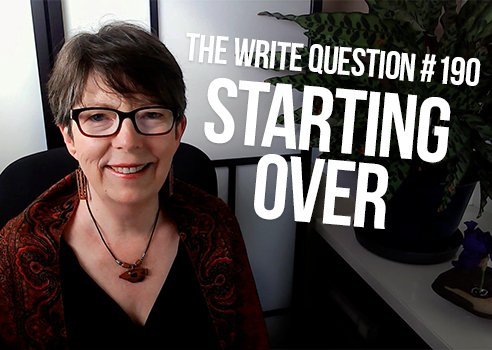Viewing time: 3 mins 27 secs
The Write Question is a weekly video podcast all about writing. Today’s question? What are the pros and cons of starting over with a writing project? If you have a question you’d like me to answer you can email me, tweet me @pubcoach, or leave a message for me at the Skype account, The Write Question.
Transcript:
What are the pros and cons of starting over with a writing project? That’s the topic I’m addressing today in The Write Question. I’m Daphne Gray-Grant, the Publication Coach, still in pandemic mode.
I have a question from Judy Newman, a writer based in Calgary, Alberta. Here’s what she’s asked by email…
“How do I tackle a piece of writing that someone else has already done but that I have the job of making better? How do I glean out the good stuff or the relevant points and start again? And how do I keep this job from consuming too much time? I find it’s harder to work from someone else’s opus than to start writing from scratch. Do you have any tips?”
Thanks for your question, Judy. To be honest, I think I have the opposite reaction to you. I love it when clients or others give me a piece from which to write because they’ve already done a lot of the work for me.
Of course, the material is usually pretty badly written, but this person has already done much of the research, so I view their efforts as a benefit, not a detriment. One less thing for me to do!
The hardest aspect of this sort of rewriting, though, is that you tend to get pulled down the path of the original writer. And if they chose a bad one, well, you’re stuck there, too! So, here’s what I suggest.
Take the piece you’ve been given and pull out the facts and quotes you still want to use. Put them in a fresh document. Then, walk away from them for at least an hour. Do something different and distracting so you can get your mind off of how the original writer approached the text. You might read something else. Write something else. Edit something else. Or tackle your email inbox.
After your break, go back to the facts and quotes you saved — don’t peek at that original piece again — and then do a mindmap on the topic. Remember that mindmaps always start with a question. For more information on mindmapping see the show-notes, below, for a link to all my blog posts and videos on the subject.
Essentially, what I’m suggesting is to treat the original piece as a research document and then use it to start the writing all over again. The mindmap will set you in a different direction from the one pursued by the original writer. And if you’ve chosen the new direction well, your new piece of writing will be much more finely honed and appropriate.
As you rightly observed, it’s harder to work from someone else’s opus than to start writing from scratch. But don’t ever neglect the benefit of someone else having done most of the research for you.
Finally, let me wrap up with the words of the late American artist Walter Darby Bannard: “Art is making something better without knowing what better is until you make it.”
Judy, I know you can write better than the amateur efforts that are being sent your way. But don’t forget that these efforts, no matter how incompetent, also present you with a valuable head-start that should save you some time.
*
If you’d like to learn more about how to make writing a happier and more rewarding process, check out my latest book Your Happy First Draft. I don’t sell it in bookstores or via Amazon. The only place to buy it is on my website, link on the screen below and in the show notes.


